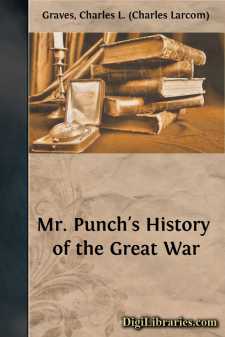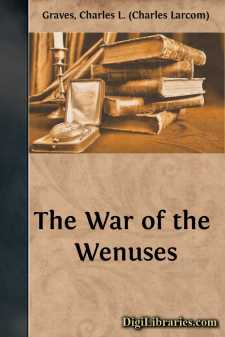Categories
- Antiques & Collectibles 13
- Architecture 36
- Art 48
- Bibles 22
- Biography & Autobiography 813
- Body, Mind & Spirit 142
- Business & Economics 28
- Children's Books 15
- Children's Fiction 12
- Computers 4
- Cooking 94
- Crafts & Hobbies 4
- Drama 346
- Education 46
- Family & Relationships 57
- Fiction 11829
- Games 19
- Gardening 17
- Health & Fitness 34
- History 1377
- House & Home 1
- Humor 147
- Juvenile Fiction 1873
- Juvenile Nonfiction 202
- Language Arts & Disciplines 88
- Law 16
- Literary Collections 686
- Literary Criticism 179
- Mathematics 13
- Medical 41
- Music 40
- Nature 179
- Non-Classifiable 1768
- Performing Arts 7
- Periodicals 1453
- Philosophy 64
- Photography 2
- Poetry 896
- Political Science 203
- Psychology 42
- Reference 154
- Religion 513
- Science 126
- Self-Help 84
- Social Science 81
- Sports & Recreation 34
- Study Aids 3
- Technology & Engineering 59
- Transportation 23
- Travel 463
- True Crime 29
Mr. Punch's History of the Great War
Description:
Excerpt
PROLOGUE
Though a lover of peace, Mr. Punch from his earliest days has not been unfamiliar with war. He was born during the Afghan campaign; in his youth England fought side by side with the French in the Crimea; he saw the old Queen bestow the first Victoria Crosses in 1857; he was moved and stirred by the horrors and heroisms of the Indian Mutiny. A little later on, when our relations with France were strained by the Imperialism of Louis Napoleon, he had witnessed the rise of the volunteer movement and made merry with the activities of the citizen soldier of Brook Green. Later on again he had watched, not without grave misgiving, the growth of the great Prussian war machine which crushed Denmark, overthrew Austria, and having isolated France, overwhelmed her heroic resistance by superior numbers and science, and stripped her of Alsace-Lorraine.
In May, 1864, Mr. Punch presented the King of Prussia with the "Order of
St. Gibbet" for his treatment of Denmark.
In August of the same year he portrayed the brigands dividing the spoil and Prussia grabbing the lion's share, thus foreshadowing the inevitable conflict with Austria.
In the war of 1870-1 he showed France on her knees but defying the new Caesar, and arraigned Bismarck before the altar of Justice for demanding exorbitant securities.
And in 1873, when the German occupation was ended by the payment of the indemnity, in a flash of prophetic vision Mr. Punch pictured France, vanquished but unsubdued, bidding her conqueror "Au revoir."
[Illustration: GAUL TO THE NEW CAESAR
"Defiance, Emperor, while I have strength to hurl it!"
(Dec. 17, 1870)]
More than forty years followed, years of peace and prosperity for Great Britain, only broken by the South African war, the wounds of which were healed by a generous settlement. But all the time Germany was preparing for "The Day," steadily perfecting her war machine, enlarging her armies, creating a great fleet, and piling up colossal supplies of guns and munitions, while her professors and historians, harnessed to the car of militarism, inflamed the people against England as the jealous enemy of Germany's legitimate expansion. Abroad, like a great octopus, she was fastening the tentacles of permeation and penetration in every corner of the globe, honeycombing Russia and Belgium, France, England and America with secret agents, spying and intriguing and abusing our hospitality. For twenty-five years the Kaiser was our frequent and honoured, if somewhat embarrassing, guest, professing friendship for England and admiration of her ways, shooting at Sandringham, competing at Cowes, sending telegrams of congratulation to the University boat-race winners, ingratiating himself with all he met by his social gifts, his vivacious conversation, his prodigious versatility and energy.
[Illustration:
THE REWARD OF (DE)MERIT
King Punch presenteth Prussia with the Order of "St. Gibbet."
(May 7, 1864)]
Mr. Punch was no enemy of Germany. He remembered—none better—the debt we owe to her learning and her art; to Bach and Beethoven, to Handel, the "dear Saxon" who adopted our citizenship; to Mendelssohn, who regarded England as his second home; to her fairy tales and folk-lore; to the Brothers Grimm and the Struwwelpeter; to the old kindly Germany which has been driven mad by War Lords and Pan-Germans....



